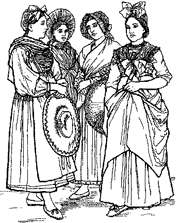While we draw a sharp line short of outright ancestor-worship, we do remember the generations of writers who have charted Provincial Thought in all its incarnations. Here are some whose names and exempla are ever-engraved in our hearts. These brief bagatelles show where we came from and whither we go:
“Mr. Pooter Gets Artistic”
April 28 In consequence of Brickwell telling me his wife was working wonders with the new
![]() Pinkford’s enamel paint, I determined to try it. I bought two tins of red on my way home. I hastened through tea, went into the garden and painted some flower-pots. I called out Carrie, who said, ‘You’ve always got some new-fangled craze;’ but she was obliged to admit that the flower-pots looked remarkably well. Went upstairs into the servant’s bedroom and painted her washstand, towel-horse, and chest of drawers. To my mind it was an extraordinary improvement, but as an example of the ignorance of the lower classes in the matter of taste, our servant, Sarah, on seeing them, evinced no sign of pleasure, but merely said, ‘she thought they looked very well as they was before.’
Pinkford’s enamel paint, I determined to try it. I bought two tins of red on my way home. I hastened through tea, went into the garden and painted some flower-pots. I called out Carrie, who said, ‘You’ve always got some new-fangled craze;’ but she was obliged to admit that the flower-pots looked remarkably well. Went upstairs into the servant’s bedroom and painted her washstand, towel-horse, and chest of drawers. To my mind it was an extraordinary improvement, but as an example of the ignorance of the lower classes in the matter of taste, our servant, Sarah, on seeing them, evinced no sign of pleasure, but merely said, ‘she thought they looked very well as they was before.’
—George and Weedon Grossmith, The Diary of a Nobody (1892)
“A Literary Chat in the Circulating Library of Kairoulla”
‘Have you read Men—My Delight, Bessie?’ Miss Hopkins asked, ‘by Cora Velasquez.’
‘No!’
‘It’s not perhaps a very . . . It’s about two dark, and three fair, men,’ she added vaguely.
‘Most women’s novels seem to run off the rails before they reach the end, and I’m not very fond of them,’ Mrs. Barleycorn said.
‘And anyway, dear, it’s out,’ Mrs. Bedley asserted.
‘The Passing of Rose I read the other day,’ Mrs. Montgomery said, ‘and so enjoyed it.’
‘Isn’t that one of Ronald Firbank’s books?’
‘No, dear, I don’t think it is. But I never remember an author’s name and I don’t think it matters!’
‘I suppose I’m getting squeamish! But this Ronald Firbank I can’t take at all. Valmouth! Was there ever a novel more coarse? I assure you I hadn’t gone very far when I had to put it down.’
‘It’s out,’ Mrs. Bedley suavely said, ‘as the rest of them.’
‘I once met him,’ Miss Hopkins said, dilating slightly the retinae of her eyes. ‘He told me writing books was by no means easy!’
Mrs. Barleymoon shrugged.
—Ronald Firbank, The Flower Beneath the Foot (1921)
| “Mr. Lardner Invents Theatre of the Absurd a Generation Prematurely” | |
| ACT I |
 |
| (A public street in a bathroom. A man named Tuppert has evidently just taken a bath. A man named Brindle is now taking a bath. A man named Newburn comes out of the faucet which has been left running. He exits through the exhaust. Two strangers to each other meet on the bath mat.) |
Where was you born?
SECOND STRANGER
Out of wedlock.
FIRST STRANGER
That’s a mighty pretty country around there.
SECOND STRANGER
Are you married?
FIRST STRANGER
I don’t know. There’s a woman living with me, but I can’t place her.
(Three outsiders named Klein go across the stage three times. They think they are in a public library. A woman’s cough is heard off-stage left.)
—Ring Lardner, “
“An Early Lesson in Gamesmanship”
The ‘flurry’ is for use when changing in the locker-room before a rackets match, perhaps, or leaving home in your opponent’s car for, say, a game of lawn tennis. The object is to create a state of anxiety, to build up an atmosphere of muddied fluster.
Supposing, for instance, that your opponent has a small car. He kindly comes along to pick you up before the game. Your procedure should be as follows: (1) Be late in answering the bell. (2) Don’t have your things ready. Appearing at last (3) call in an anxious or ‘rattled’ voice to wife (who need not, of course, be there at all) some taut last-minute questions about dinner. Walk down path and (4) realize you have forgotten shoes. Return with shoes; then just before getting into car pause (5) a certain length of time (see any threepenny edition of Bohn’s Tables) and wonder (i) whether racket is at the club or (ii) whether you have left it ‘in the bath-room at the top of the house.’
Like the first hint of paralysis, a scarcely observable fixing of your opponent’s expression should now be visible. Now is the time to redouble the attack. Map-play can be brought to bear. On the journey let it be known that you ‘think you know a better way,’ which should turn out, when followed, to be incorrect and should if possible lead to a blind alley.
—Stephen Potter, Gamesmanship (1950)
Study these exempla carefully, for they point toward the very essence of JPT, should you aspire to grace our Web pages as a contributor or should you merely wish to know more about the crack-pottery on which you have been wasting your precious computer time. —Eds.
![]()
| jptHOME Issue 4 |
| Copyright 2007- WJ Schafer & WC Smith - All Rights Reserved |

| jptHome Issue 4 |
| jptArchives |
| The Journal of Provincial Thought |
